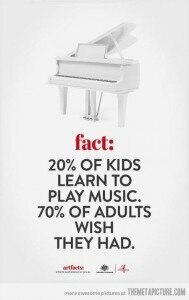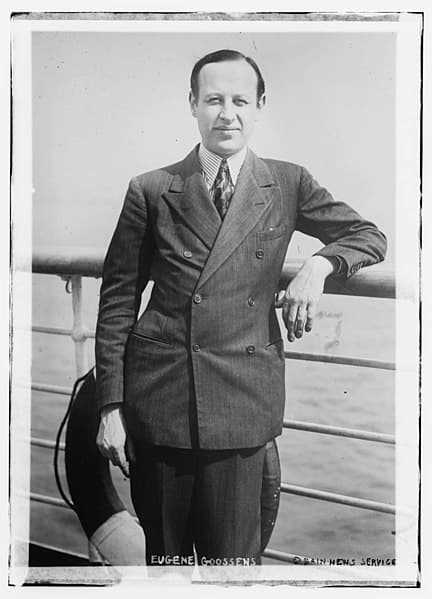 My parents were both musicians. There was never any doubt in our household. Music lessons were essential. I took lessons both on cello and piano with the requisite theory lessons, and that was that. No instructor, no teaching style, no study books, no regimen was good enough for them! I’m embarrassed to admit that there were tears shed, doors slammed, and endless whining.
My parents were both musicians. There was never any doubt in our household. Music lessons were essential. I took lessons both on cello and piano with the requisite theory lessons, and that was that. No instructor, no teaching style, no study books, no regimen was good enough for them! I’m embarrassed to admit that there were tears shed, doors slammed, and endless whining.
I had standards drilled into me. I heard my mother’s brilliant little piano students, and the sounds of my father’s rigorous practicing. I tried to imitate them at a very young age.
Learning a musical instrument is a long-term commitment. It is akin to learning a new language, but it is even more difficult! Not only do we have to learn to read the music and to translate and interpret what we see on the sheet music page, we also have to master the physical challenges of playing including proper, relaxed positions, correct postures and mastering the coordination required. At the same time we learn how to concentrate, apply ourselves with patience and perseverance, and to be expressive emotionally.
When I was a beginner, my parents knew only too well how to approach lessons. They had European training and high standards. No need to be as demanding as they were!
Non-playing parents consider these important tips before you embark on the adventure of music lessons for your child.
1. The relationship between your child and the teacher is invaluable. She or he may become a mentor and an inspiration for many years. A little research will pay off. Ask for recommendations. Then talk to the teacher’s current or former students and parents. Is this teacher strict? Nurturing? Prepared? Experienced with children? Does this teacher consider both the physical and emotional nature of playing? Attend a recital of this teacher’s students to get a feel for how successful and confident the students are.
2. Make an appointment for a trial lesson. Bring your child with you when you interview the instructor. Together you can get a sense of the teacher’s style. Observe how they interact. Do you sense that your child will feel comfortable to discuss their feelings and challenges? Everyone is different—will the personality of the teacher “click” with your youngster?
3. Discuss the teacher’s expectations. What materials does he or she use? Is she inventive in her approach? How much practice is expected? Does he hold annual recitals? Does the style of learning gel with your child’s learning style?
4. Try not to speak for your child. Give her an opportunity to speak for herself and to ask her own questions.
5. Learning to play an instrument well takes time, consistency, and stick to it-ivness. Discuss this with your child so that he understands that you are serious about the lessons and that you are not taking a “we’ll see how it goes” attitude. That said; do think about how busy the child is with other activities.
 6. Rent or purchase a good instrument that is the right size for your child. It should not be too heavy, resistant, (that is, hard to play), or too large for the child. Avoid instruments with long reaches, big stretches or one that is unwieldy for the size of the young person. Make certain that the chair the child uses allows for their feet to be firmly on the floor. Comfort is a priority.
6. Rent or purchase a good instrument that is the right size for your child. It should not be too heavy, resistant, (that is, hard to play), or too large for the child. Avoid instruments with long reaches, big stretches or one that is unwieldy for the size of the young person. Make certain that the chair the child uses allows for their feet to be firmly on the floor. Comfort is a priority.
7. Avoid criticizing your child. Set a time for daily practice and be available to assist and encourage him. Practicing should be fun not a battle.
8. Just like all learning, each child will progress at his own pace. Improvements often occur in small increments. Avoid comparing your child to others. Be encouraging and show pride in the progress your child is making.
9. The quality and consistency of practice time spent is much more important than the quantity. A concentrated period of twenty minutes of slow practice while isolating the hard spots, is much more beneficial than repeating passages over and over and oftentimes then repeating the errors! Reward each milestone with a sticker or a fun activity.
10. Don’t make excuses for the child in front of the teacher. Don’t cancel a lesson when the student didn’t practice enough during the week. The teacher can always use the time to practice with the child and to help her learn how to practice more effectively.
Studies indicate that music lessons enhance other learning. As a parent you will notice many other benefits. You might see an increase in their self-esteem, better language development, increased co-ordination and confidence, and improved test scores. Spatial- temporal skills will improve, which will help in solving problems that are encountered in math, engineering, computing, architecture and art. And let’s not forget that playing music is an emotional outlet.
Most important, music making is one of the few activities in life that utilizes both the left and right side of the brain. Playing music with others of varying age groups, cultures or affiliations, will reap lifetime rewards and enjoyment. Make sure to take your youngster to concerts so they can hear what can be accomplished.
Through beautiful music, wordlessly, we can learn how to work together, be more empathetic and to communicate better with others. Here are some outstanding children to inspire you!
Prodigy Cellist Will Amaze You
Awe-Inspiring 9-Yr-Old Piano Prodigy
The flashmob of Prodigies



